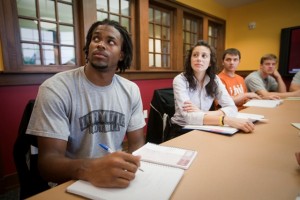
Students study during a session at the Academic Tutoring & Training Information Center (ATTIC).
In the NCAA’s most recent report on graduation-success rates at the nation’s Division I schools, released in October, Lafayette ranks No. 3, with a rate of 97 percent. Lafayette has placed among the leaders in the last several NCAA reports, consistently posting a graduation-success rate above 90 percent. The national average is in the 70 percent range.
President Daniel H. Weiss is “very pleased,” he says. But not surprised.
“In an age of compromise and corruption in college athletics, Lafayette and the Patriot League have been steadfast in an enduring commitment to academics,” Weiss says. “It’s not a bonus when our student athletes excel academically. They are expected to thrive.”
* * * * *
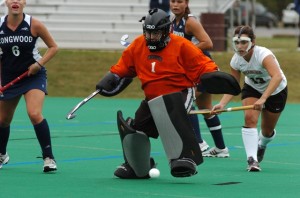
Field hockey athlete Kelsey Andersen '11 in goal
Kelsey Andersen ’11 and Stefan Bauer ’11 are among the 504 Lafayette students who are varsity athletes (that’s more than one-fifth of all students). Thriving? Yes.
A four-year starter in goal, Andersen (West Long Branch, N.J.) helped lead the field hockey team to the championship game of the Patriot League tournament three times. As a junior, she was named a first-team all-star and Goalkeeper of the Year by the league and third-team All-American by the National Field Hockey Coaches Association.
A biology major with an interdisciplinary minor in health care and society and a 3.37 GPA, she’s been heavily involved in academic pursuits beyond the classroom. In the summer of 2009, she took Lafayette’s London-based course Social and Ethical Aspects of Health Care in the United Kingdom and the United States. Her experience in England included an internship in pediatric occupational therapy.
“Amazing,” she says. “The internship gave me a unique opportunity to work in a variety of diverse school and hospital settings in London and to meet some extraordinary people.”
Another “most interesting” experience was doing research with Manuel Ospina-Giraldo, assistant professor of biology, on Phytophthora infestans, the organism that “was the cause of the potato famine in Ireland in the 1840s and still poses a major threat to crops today. The independent part of the project taught me a lot about the creative aspects of scientific research that you don’t get a chance to see in the entry-level courses,” she says.
“Kelsey has always been a team leader, doing extra work off the field and on her own time,” field hockey coach Andrew Griffiths says. “Her determination to be successful has translated from field hockey to academics, and that will lead to great opportunities in whatever she chooses to do.”
Last spring, Bauer (Ho Ho Kus, N.J.) was named to the Tewaaraton Award “watch list” as a candidate for the highest individual honor in collegiate lacrosse. He ranked No. 5 in assists per game and No. 32 in points per game among Division I players nationally in 2010, helping lead his team in a season of significant firsts for men’s lacrosse, including being ranked in the national top 20 for eight straight weeks and defeating two nationally ranked teams, Navy and Bucknell.
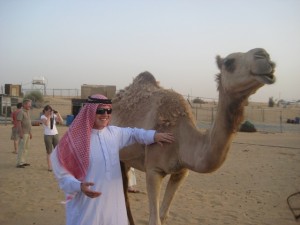
Stefan Bauer '11 in Dubai
An economics major with a 3.61 GPA, Bauer was awarded a William Jefferson Clinton Scholarship to study at American University in Dubai during the summer between his sophomore and junior years. “I took classes on Middle Eastern cultures, media in the Middle East, and international business,” he says. “The teachers and students were from all over the world and had many different perspectives.”
During the January interim session before last year’s outstanding lacrosse season, Bauer was one of 10 students who traveled to Madagascar to launch the Lafayette Initiative for Malagasy Education, or LIME, aimed at helping Malagasy students prepare for the process of applying to U.S. colleges (and at helping Lafayette students learn about the challenges of development in one of the poorest countries in the world). A member of Omicron Delta Epsilon, the international economics honor society, he was a Rhodes Scholar candidate.
“Stefan epitomizes the student athlete. He has become one of the best lacrosse players in the country and exceeded all expectations in the classroom,” says lacrosse coach Terry Mangan. “As with all programs at Lafayette, we expect our athletes to push themselves academically. But what Stefan has done, extending himself well beyond the classroom, is truly outstanding.”
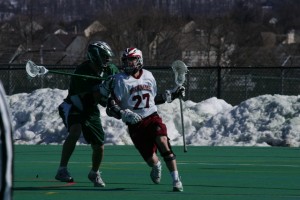
Stefan Bauer '11 on the field
Andersen and Bauer were honored in November as this year’s Maroon Club Scholar-Athletes, recognizing their exemplary performance in the classroom and on the field of play. They are hardly isolated cases of academic achievement among student athletes.
Fourteen of Lafayette’s 23 intercollegiate sports programs boasted a graduation-success rate of 100 percent in the most recent NCAA report, and all programs registered well above the national average for their sport.
In the 2009-10 academic year, Lafayette earned 16 NCAA Public Recognition Awards, which are given annually to teams scoring in the top 10 percent in each sport with their Academic Progress Rates. Golf, field hockey, and men’s soccer claimed additional national accolades for academic excellence. In all, 266 student athletes were named to the Patriot League Academic Honor Roll, for which athletes must have a 3.20 GPA during the semester when their sport is in season.
“These numbers and individual accomplishments confirm our commitment to providing the highest quality experience for our student athletes,” says Bruce McCutcheon, director of athletics. “Tremendous demands are placed on these young people both academically and athletically. We are extremely pleased that the latest data reflects the academic success of the men and women representing Lafayette.”
* * * * *
“It’s our intention to create the best possible environment for our student athletes to achieve both their academic and athletic goals,” McCutcheon says. “The ATTIC is a valuable resource to assist them in attaining their academic aspirations.”
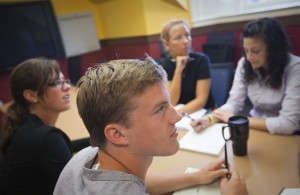
A session in the ATTIC
The Academic Tutoring and Training Information Center, in the Office of the Dean of the College, provides numerous programs to ensure that the “student” portion of “student athlete” remains the number-one priority. All first-year student athletes attend the ATTIC’s academic enhancement workshops, which cover time management, note-taking, exam-preparation skills, and other topics. Student athletes also attend structured study, a study hall session held Monday through Friday. Coaches receive weekly reports on student athletes’ attendance at structured study.
“The workshops and structured study are beneficial,” says basketball player Madeline Fahan ’14 (Ventura, Calif.). “It felt like a struggle at first to fit one more thing into my schedule, but it’s definitely helpful to have a quiet and focused environment to get work done.”
Academic enhancement workshops are run by peer mentors, upper-level student athletes who are trained to guide and assist first-year student athletes in adjusting to the rigors of college. The number of peer mentors has nearly doubled in the last four years, growing from 11 to 21, according to Dana Filchner, associate director of the ATTIC and coordinator of academic support for athletes. Each mentor is assigned to five first-year students. They meet one on one every week to discuss academic, athletic, and personal issues.
“I enjoy helping younger student athletes make the transition from high school to college as smoothly as possible,” says peer mentor Brandon Ellis ’11 (Jeffersonville, Pa.), an economics major and first-team Patriot League all-star at defensive back for the football team. He earned Academic All-Patriot League and ESPN Academic All-District honors. “I want to give back to the Lafayette community. As a peer mentor, I’m doing that,” he says.
“One of the many great things about Lafayette is that nobody ever assumes that you don’t need a helping hand,” Mangan says. “Whether you need extra structure and guidance to succeed or you are doing very well and want to do even better, the College has something to offer.”
* * * * *
Each varsity team has a faculty mentor or two. “Students appreciate the visible link between academics and athletics,” says Alan Childs, faculty mentor for the men’s basketball team, who has been a fixture on the sidelines, home and away, for 20 seasons. A professor of psychology and director of the College’s Center for the Integration of Teaching, Learning, and Scholarship, Childs was an advocate for a faculty-mentor program prior to its inception in 1990. “I see myself as another resource,” he says.
Weiss became faculty mentor for women’s soccer this year. “My athletic experience was an integral facet of my education,” says Weiss, who captained his high school football team at the Wheatley School in Old Westbury, N.Y. He estimates that he’s met individually with at least three-quarters of the team’s members since August. “I knew this was something I wanted to do, but I had no idea just how enjoyable and rewarding the experience would be.”
Head coaches, too, play a major role in their players’ academic advancement. They receive weekly updates from professors and the ATTIC, and many of them discuss academics with their players regularly. “For better or for worse, students will do what the coaches require of them. In order for our student athletes to be successful, our coaches have to believe in our message as well,” Weiss says.
“People sometimes forget that coaches teach, and in a much more public venue than professors do,” Childs says. “I’ve learned a lot about how to think about teaching and how to present new or challenging material from watching [basketball coach] Fran O’Hanlon.”





1 Comment
Comments are closed.